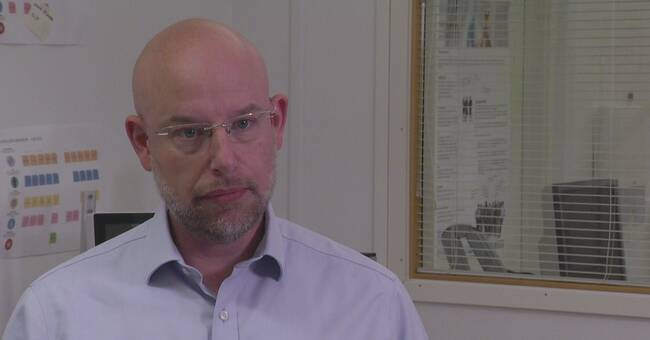- We have bought a system that we now need to adapt to Swedish legislation and the Swedish way of working.
That work is ongoing and of course during that process you get fears, says Fredrik Jonsson, clinically responsible for the introduction of the new medical record system.
He is a doctor himself and says that he understands his colleagues' concerns but that the concerns are part of the process.
He believes that it is better for healthcare staff to adapt the new IT system than for technicians to do so.
- There is always a balance between being clinically active and getting involved in development projects, but the important thing is that they are involved because otherwise we will get a system that is made by someone else, says Fredrik Jonsson.
The entrance to SDV's premises at Medicon village in Lund.
Photo: Linda Fridh / SVT
"Called to build a functioning system"
The endoscopy doctors state that the new medical record system lacks a system for image documentation in endoscopy and that the doctors this summer were told to build a system themselves.
According to the doctors, it takes decades to develop a patient-safe computer system for endoscopy that follows Swedish and international guidelines.
- They are encouraged to configure, to contribute their knowledge so that we can adapt the system so that it works for them.
Is it reasonable to buy such a large system that lacks advanced features?
- Yes, I think it is completely reasonable.
We currently have 50 systems and now we will have a system that solves the functionality for these 50. While we configure the system, we will have a gap.
This is not strange.
But the total benefit for both our patients and employees will be much greater and safer if we keep it together in one system.
- The biggest benefit is that we get the patient's information in a single system.
The patient does not have to repeat the same information at each visit, says Fredrik Jonsson, clinically responsible for the roll-out of SDV.
The picture is from SDV's test lab at Medicon village in Lund.
Photo: Linda Fridh / SVT
Not immoral
The endoscopy doctors have asked to link their current functioning image documentation system to the American medical record system, but were denied by Region Skåne with reference to a decision in principle.
Fredrik Jonsson believes that this may be a misunderstanding because some external programs will eventually be linked to the American IT company Cerner's system, which the region purchased to get a cohesive medical record system.
This weekend, SVT Nyheter Skåne revealed harsh internal criticism of the project.
Endoscopy doctors have called the project "crashed" and claimed that cancer queues grow when staff have to deal with computer systems.
Fredrik Jonsson rejects the criticism that it would be "immoral".
- I think it would be immoral not to do this for the people of Skåne.
Today we have 50 different systems that we have information about the patients in which we put time and effort to ensure that we do not miss anything.
I think that anything other than not making a digitization in Skåne would be immoral, says Fredrik Jonsson.
"Giant challenge"
How big a challenge is it really to introduce such a large, cohesive computer system for healthcare in Skåne?
- The challenge is gigantic.
We will partly get new ways of working, new tools, IT tools, and make all this work, it will be a terrible challenge.
Is there anything like this anywhere else in the world?
- No, we are probably among the first to have gone from one digital system to another.
We've found a hospital in Texas.
But otherwise we are quite unique, says Fredrik Jonsson, clinically responsible for the introduction of Skåne's digital care system.

